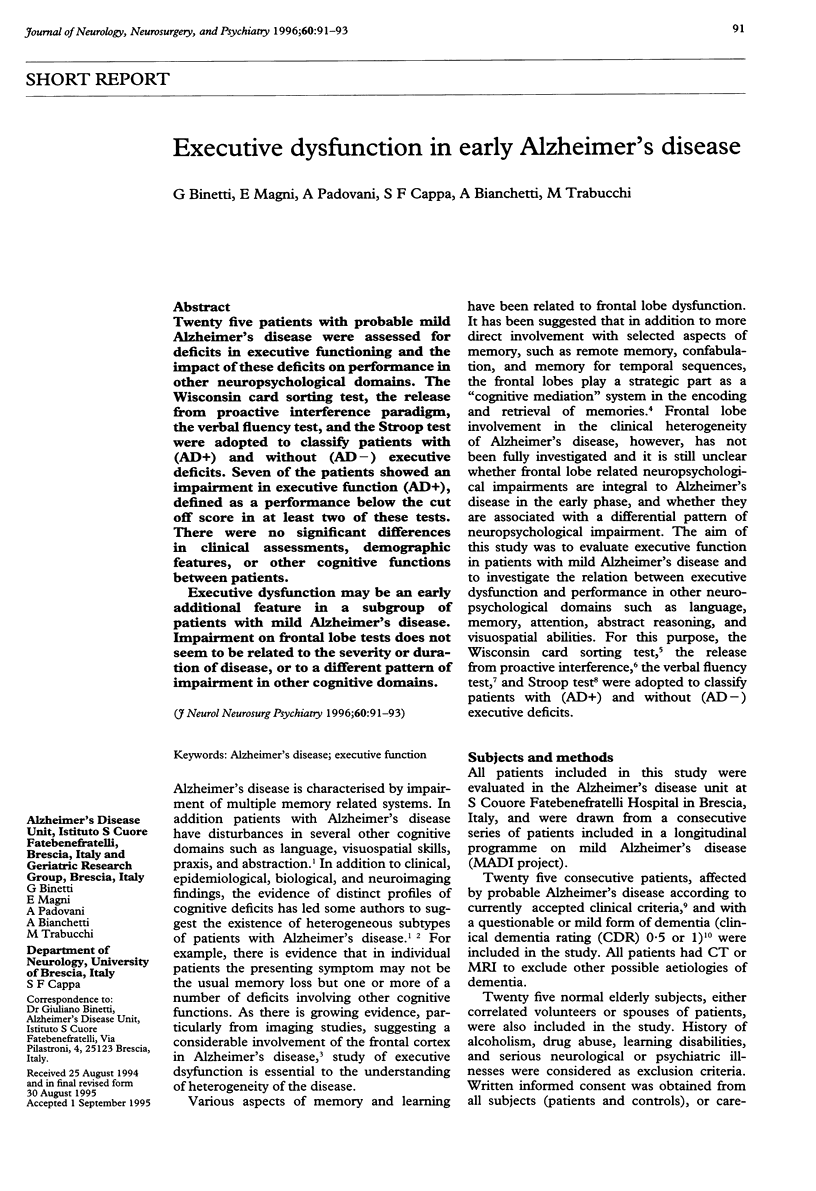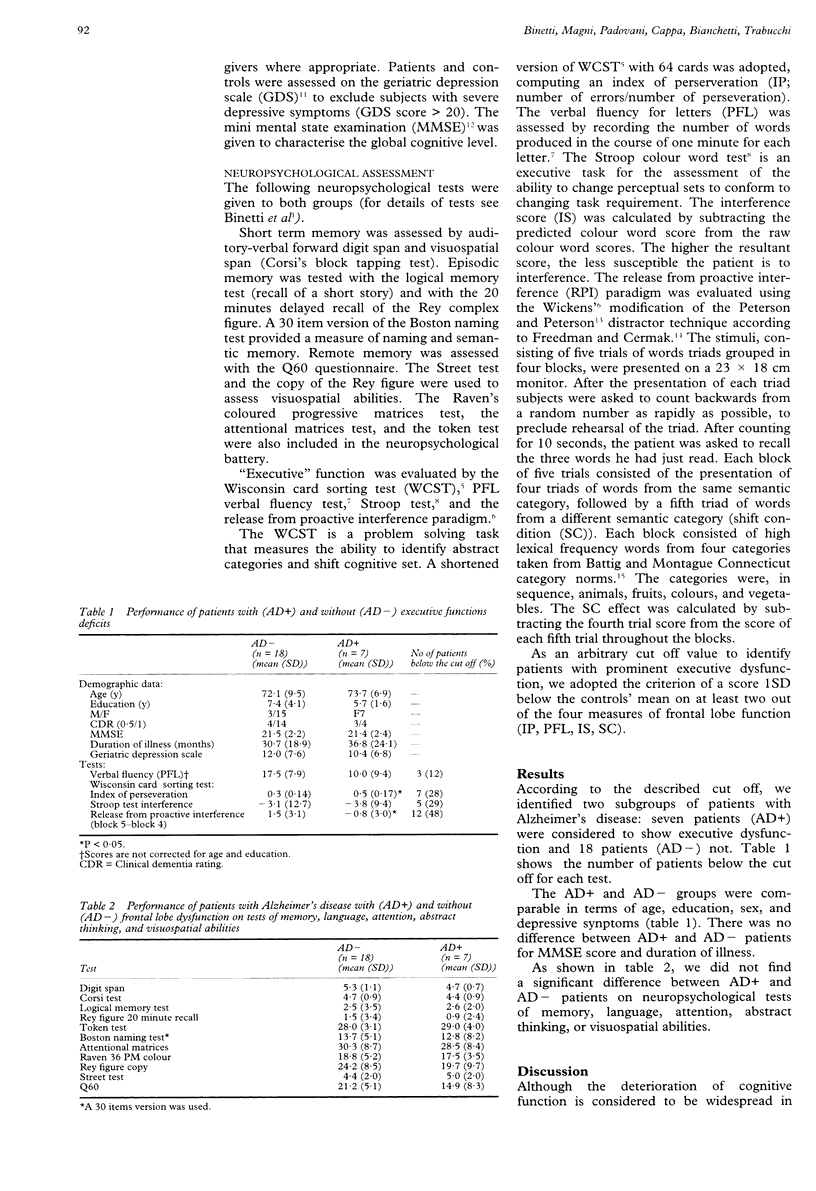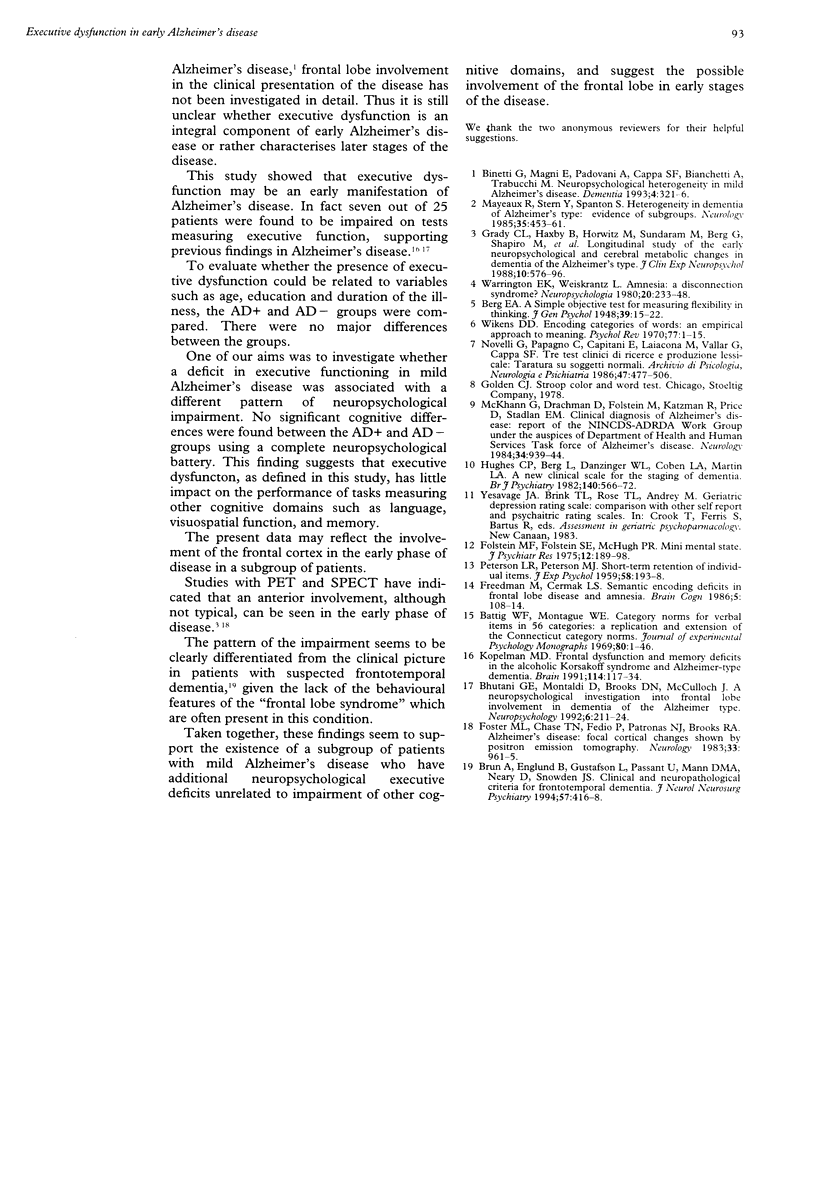Abstract
Twenty five patients with probable mild Alzheimer's disease were assessed for deficits in executive functioning and the impact of these deficits on performance in other neuropsychological domains. The Wisconsin card sorting test, the release from proactive interference paradigm, the verbal fluency test, and the Stroop test were adopted to classify patients with (AD+) and without (AD-) executive deficits. Seven of the patients showed an impairment in executive function (AD+), defined as a performance below the cut off score in at least two of these tests. There were no significant differences in clinical assessments, demographic features, or other cognitive functions between patients. Executive dysfunction may be an early additional feature in a subgroup of patients with mild Alzheimer's disease. Impairment on frontal lobe tests does not seem to be related to the severity or duration of disease, or to a different pattern of impairment in other cognitive domains.
Full text
PDF


Selected References
These references are in PubMed. This may not be the complete list of references from this article.
- Binetti G., Magni E., Padovani A., Cappa S. F., Bianchetti A., Trabucchi M. Neuropsychological heterogeneity in mild Alzheimer's disease. Dementia. 1993 Nov-Dec;4(6):321–326. doi: 10.1159/000107340. [DOI] [PubMed] [Google Scholar]
- Clinical and neuropathological criteria for frontotemporal dementia. The Lund and Manchester Groups. J Neurol Neurosurg Psychiatry. 1994 Apr;57(4):416–418. doi: 10.1136/jnnp.57.4.416. [DOI] [PMC free article] [PubMed] [Google Scholar]
- Folstein M. F., Folstein S. E., McHugh P. R. "Mini-mental state". A practical method for grading the cognitive state of patients for the clinician. J Psychiatr Res. 1975 Nov;12(3):189–198. doi: 10.1016/0022-3956(75)90026-6. [DOI] [PubMed] [Google Scholar]
- Foster N. L., Chase T. N., Fedio P., Patronas N. J., Brooks R. A., Di Chiro G. Alzheimer's disease: focal cortical changes shown by positron emission tomography. Neurology. 1983 Aug;33(8):961–965. doi: 10.1212/wnl.33.8.961. [DOI] [PubMed] [Google Scholar]
- Freedman M., Cermak L. S. Semantic encoding deficits in frontal lobe disease and amnesia. Brain Cogn. 1986 Jan;5(1):108–114. doi: 10.1016/0278-2626(86)90063-1. [DOI] [PubMed] [Google Scholar]
- Hughes C. P., Berg L., Danziger W. L., Coben L. A., Martin R. L. A new clinical scale for the staging of dementia. Br J Psychiatry. 1982 Jun;140:566–572. doi: 10.1192/bjp.140.6.566. [DOI] [PubMed] [Google Scholar]
- Kopelman M. D. Frontal dysfunction and memory deficits in the alcoholic Korsakoff syndrome and Alzheimer-type dementia. Brain. 1991 Feb;114(Pt 1A):117–137. [PubMed] [Google Scholar]
- Mayeux R., Stern Y., Spanton S. Heterogeneity in dementia of the Alzheimer type: evidence of subgroups. Neurology. 1985 Apr;35(4):453–461. doi: 10.1212/wnl.35.4.453. [DOI] [PubMed] [Google Scholar]
- McKhann G., Drachman D., Folstein M., Katzman R., Price D., Stadlan E. M. Clinical diagnosis of Alzheimer's disease: report of the NINCDS-ADRDA Work Group under the auspices of Department of Health and Human Services Task Force on Alzheimer's Disease. Neurology. 1984 Jul;34(7):939–944. doi: 10.1212/wnl.34.7.939. [DOI] [PubMed] [Google Scholar]
- PETERSON L. R., PETERSON M. J. Short-term retention of individual verbal items. J Exp Psychol. 1959 Sep;58:193–198. doi: 10.1037/h0049234. [DOI] [PubMed] [Google Scholar]


